HAT301 Case Study: Event Lifecycle & 2018 Winter Olympics
VerifiedAdded on 2023/06/10
|8
|1947
|354
Case Study
AI Summary
This case study analyzes the 2018 Winter Olympics held in Pyeongchang, South Korea, through the lens of the Event Life Cycle model. It examines the formation stage, highlighting the initial idea and feasibility assessments; the growth stage, detailing the bidding campaign, venue planning, and marketing strategies; and the staging of the event itself. Furthermore, it evaluates the future development of the event destination, focusing on long-term destination positioning and tourism product development. The study concludes with recommendations addressing stakeholder concerns related to the sustainability of such mega-events, emphasizing resource usage, waste management, and the importance of sustainable citizenship. The analysis aims to provide insights into the core management principles of creating, designing, planning, and ensuring the sustainability of large-scale events.
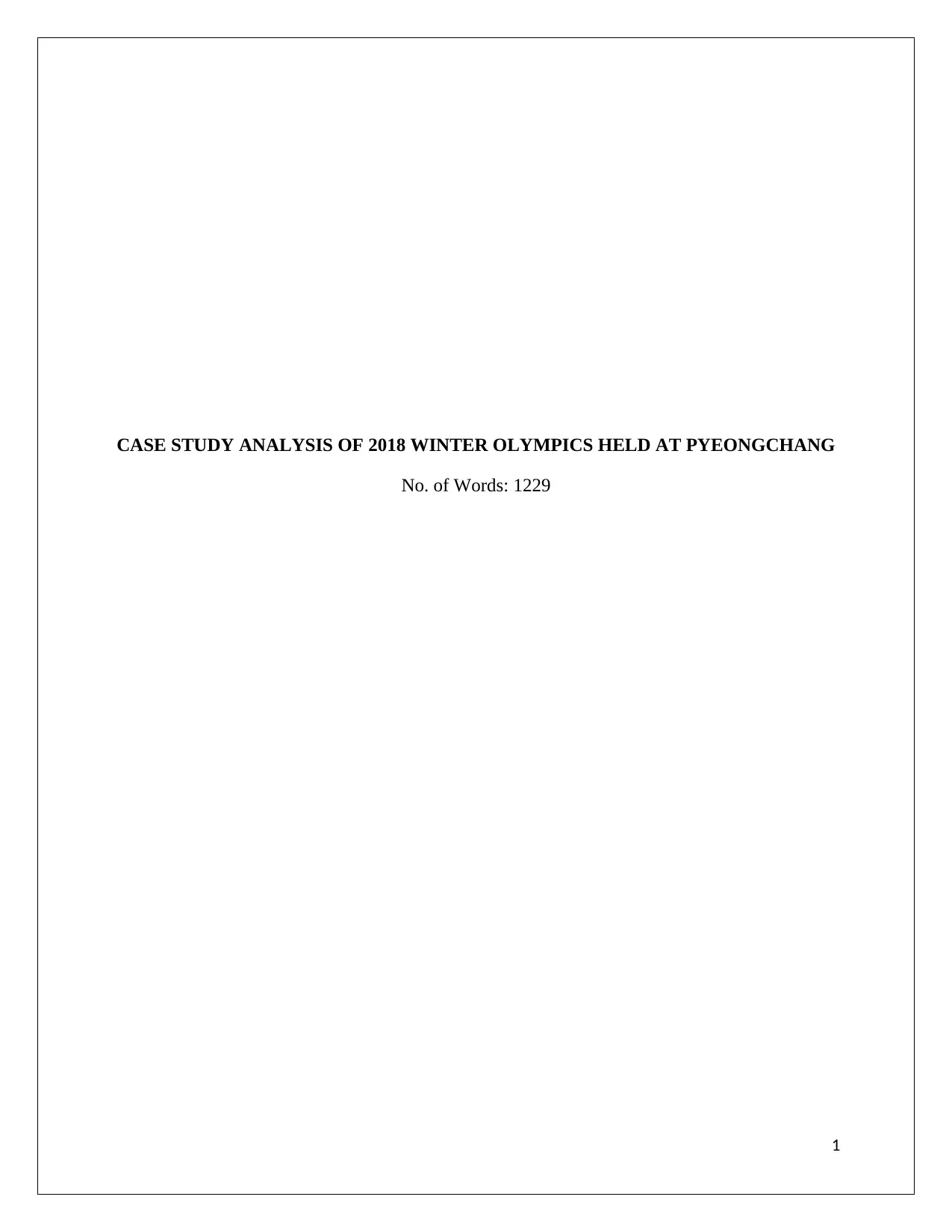
CASE STUDY ANALYSIS OF 2018 WINTER OLYMPICS HELD AT PYEONGCHANG
No. of Words: 1229
1
No. of Words: 1229
1
Paraphrase This Document
Need a fresh take? Get an instant paraphrase of this document with our AI Paraphraser
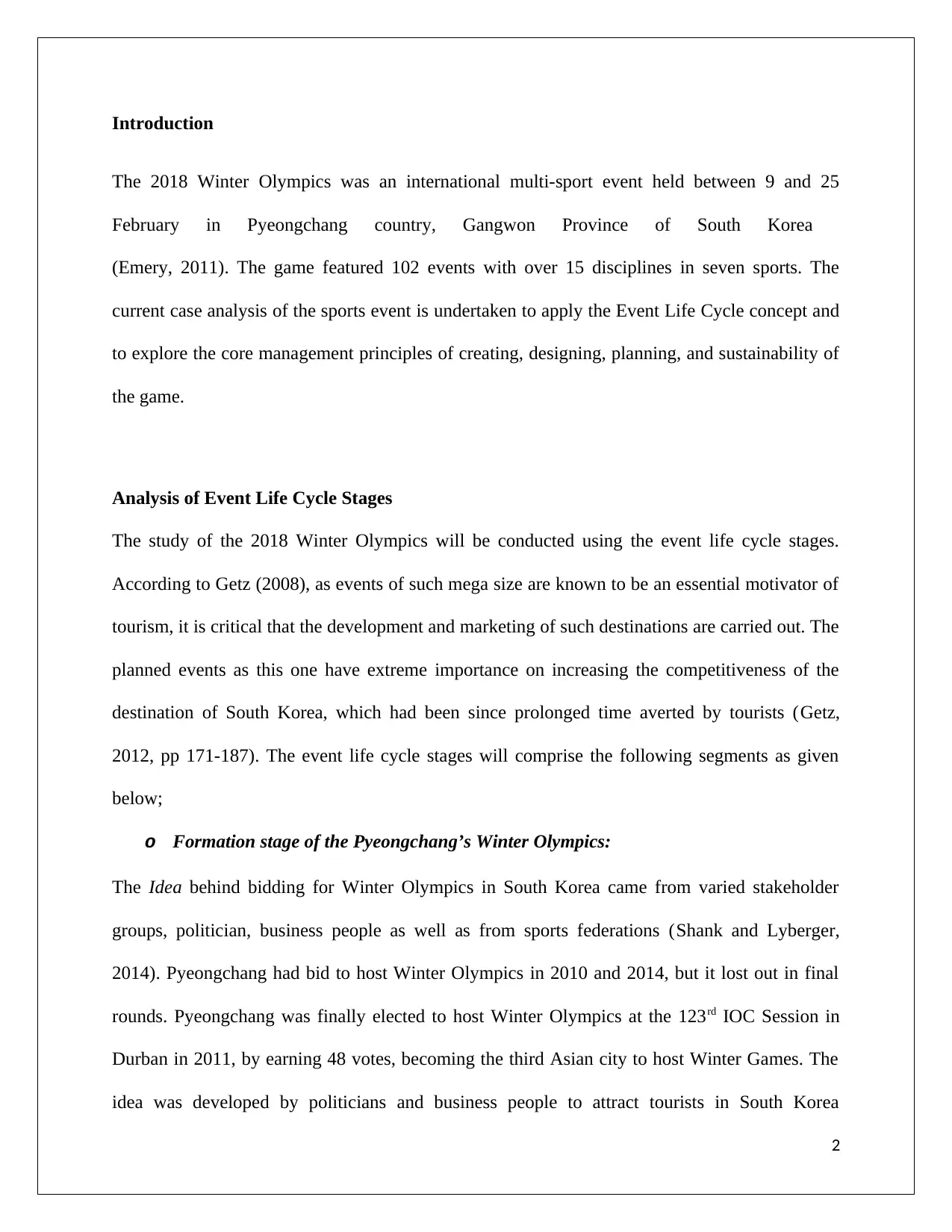
Introduction
The 2018 Winter Olympics was an international multi-sport event held between 9 and 25
February in Pyeongchang country, Gangwon Province of South Korea
(Emery, 2011). The game featured 102 events with over 15 disciplines in seven sports. The
current case analysis of the sports event is undertaken to apply the Event Life Cycle concept and
to explore the core management principles of creating, designing, planning, and sustainability of
the game.
Analysis of Event Life Cycle Stages
The study of the 2018 Winter Olympics will be conducted using the event life cycle stages.
According to Getz (2008), as events of such mega size are known to be an essential motivator of
tourism, it is critical that the development and marketing of such destinations are carried out. The
planned events as this one have extreme importance on increasing the competitiveness of the
destination of South Korea, which had been since prolonged time averted by tourists (Getz,
2012, pp 171-187). The event life cycle stages will comprise the following segments as given
below;
o Formation stage of the Pyeongchang’s Winter Olympics:
The Idea behind bidding for Winter Olympics in South Korea came from varied stakeholder
groups, politician, business people as well as from sports federations (Shank and Lyberger,
2014). Pyeongchang had bid to host Winter Olympics in 2010 and 2014, but it lost out in final
rounds. Pyeongchang was finally elected to host Winter Olympics at the 123rd IOC Session in
Durban in 2011, by earning 48 votes, becoming the third Asian city to host Winter Games. The
idea was developed by politicians and business people to attract tourists in South Korea
2
The 2018 Winter Olympics was an international multi-sport event held between 9 and 25
February in Pyeongchang country, Gangwon Province of South Korea
(Emery, 2011). The game featured 102 events with over 15 disciplines in seven sports. The
current case analysis of the sports event is undertaken to apply the Event Life Cycle concept and
to explore the core management principles of creating, designing, planning, and sustainability of
the game.
Analysis of Event Life Cycle Stages
The study of the 2018 Winter Olympics will be conducted using the event life cycle stages.
According to Getz (2008), as events of such mega size are known to be an essential motivator of
tourism, it is critical that the development and marketing of such destinations are carried out. The
planned events as this one have extreme importance on increasing the competitiveness of the
destination of South Korea, which had been since prolonged time averted by tourists (Getz,
2012, pp 171-187). The event life cycle stages will comprise the following segments as given
below;
o Formation stage of the Pyeongchang’s Winter Olympics:
The Idea behind bidding for Winter Olympics in South Korea came from varied stakeholder
groups, politician, business people as well as from sports federations (Shank and Lyberger,
2014). Pyeongchang had bid to host Winter Olympics in 2010 and 2014, but it lost out in final
rounds. Pyeongchang was finally elected to host Winter Olympics at the 123rd IOC Session in
Durban in 2011, by earning 48 votes, becoming the third Asian city to host Winter Games. The
idea was developed by politicians and business people to attract tourists in South Korea
2
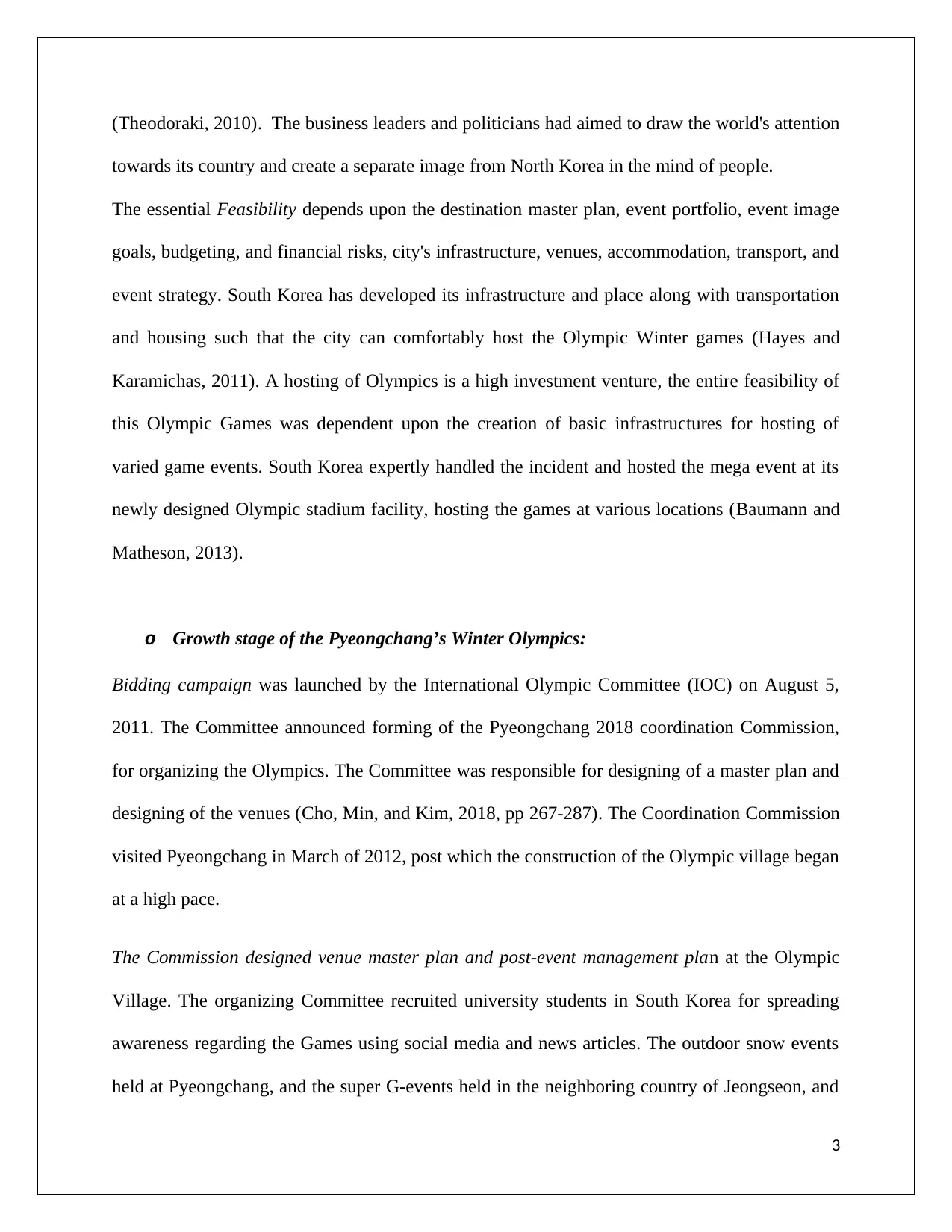
(Theodoraki, 2010). The business leaders and politicians had aimed to draw the world's attention
towards its country and create a separate image from North Korea in the mind of people.
The essential Feasibility depends upon the destination master plan, event portfolio, event image
goals, budgeting, and financial risks, city's infrastructure, venues, accommodation, transport, and
event strategy. South Korea has developed its infrastructure and place along with transportation
and housing such that the city can comfortably host the Olympic Winter games (Hayes and
Karamichas, 2011). A hosting of Olympics is a high investment venture, the entire feasibility of
this Olympic Games was dependent upon the creation of basic infrastructures for hosting of
varied game events. South Korea expertly handled the incident and hosted the mega event at its
newly designed Olympic stadium facility, hosting the games at various locations (Baumann and
Matheson, 2013).
o Growth stage of the Pyeongchang’s Winter Olympics:
Bidding campaign was launched by the International Olympic Committee (IOC) on August 5,
2011. The Committee announced forming of the Pyeongchang 2018 coordination Commission,
for organizing the Olympics. The Committee was responsible for designing of a master plan and
designing of the venues (Cho, Min, and Kim, 2018, pp 267-287). The Coordination Commission
visited Pyeongchang in March of 2012, post which the construction of the Olympic village began
at a high pace.
The Commission designed venue master plan and post-event management plan at the Olympic
Village. The organizing Committee recruited university students in South Korea for spreading
awareness regarding the Games using social media and news articles. The outdoor snow events
held at Pyeongchang, and the super G-events held in the neighboring country of Jeongseon, and
3
towards its country and create a separate image from North Korea in the mind of people.
The essential Feasibility depends upon the destination master plan, event portfolio, event image
goals, budgeting, and financial risks, city's infrastructure, venues, accommodation, transport, and
event strategy. South Korea has developed its infrastructure and place along with transportation
and housing such that the city can comfortably host the Olympic Winter games (Hayes and
Karamichas, 2011). A hosting of Olympics is a high investment venture, the entire feasibility of
this Olympic Games was dependent upon the creation of basic infrastructures for hosting of
varied game events. South Korea expertly handled the incident and hosted the mega event at its
newly designed Olympic stadium facility, hosting the games at various locations (Baumann and
Matheson, 2013).
o Growth stage of the Pyeongchang’s Winter Olympics:
Bidding campaign was launched by the International Olympic Committee (IOC) on August 5,
2011. The Committee announced forming of the Pyeongchang 2018 coordination Commission,
for organizing the Olympics. The Committee was responsible for designing of a master plan and
designing of the venues (Cho, Min, and Kim, 2018, pp 267-287). The Coordination Commission
visited Pyeongchang in March of 2012, post which the construction of the Olympic village began
at a high pace.
The Commission designed venue master plan and post-event management plan at the Olympic
Village. The organizing Committee recruited university students in South Korea for spreading
awareness regarding the Games using social media and news articles. The outdoor snow events
held at Pyeongchang, and the super G-events held in the neighboring country of Jeongseon, and
3
⊘ This is a preview!⊘
Do you want full access?
Subscribe today to unlock all pages.

Trusted by 1+ million students worldwide
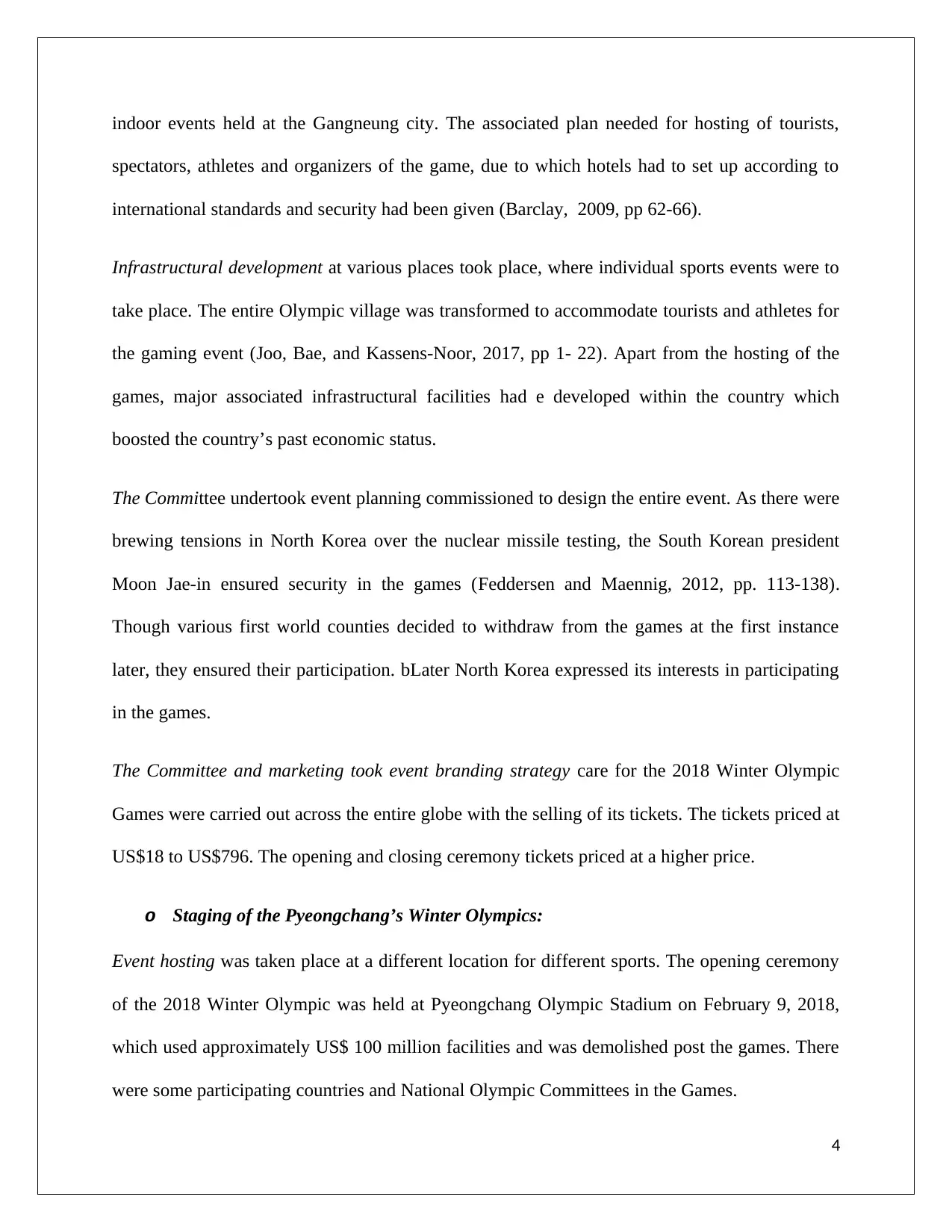
indoor events held at the Gangneung city. The associated plan needed for hosting of tourists,
spectators, athletes and organizers of the game, due to which hotels had to set up according to
international standards and security had been given (Barclay, 2009, pp 62-66).
Infrastructural development at various places took place, where individual sports events were to
take place. The entire Olympic village was transformed to accommodate tourists and athletes for
the gaming event (Joo, Bae, and Kassens-Noor, 2017, pp 1- 22). Apart from the hosting of the
games, major associated infrastructural facilities had e developed within the country which
boosted the country’s past economic status.
The Committee undertook event planning commissioned to design the entire event. As there were
brewing tensions in North Korea over the nuclear missile testing, the South Korean president
Moon Jae-in ensured security in the games (Feddersen and Maennig, 2012, pp. 113-138).
Though various first world counties decided to withdraw from the games at the first instance
later, they ensured their participation. bLater North Korea expressed its interests in participating
in the games.
The Committee and marketing took event branding strategy care for the 2018 Winter Olympic
Games were carried out across the entire globe with the selling of its tickets. The tickets priced at
US$18 to US$796. The opening and closing ceremony tickets priced at a higher price.
o Staging of the Pyeongchang’s Winter Olympics:
Event hosting was taken place at a different location for different sports. The opening ceremony
of the 2018 Winter Olympic was held at Pyeongchang Olympic Stadium on February 9, 2018,
which used approximately US$ 100 million facilities and was demolished post the games. There
were some participating countries and National Olympic Committees in the Games.
4
spectators, athletes and organizers of the game, due to which hotels had to set up according to
international standards and security had been given (Barclay, 2009, pp 62-66).
Infrastructural development at various places took place, where individual sports events were to
take place. The entire Olympic village was transformed to accommodate tourists and athletes for
the gaming event (Joo, Bae, and Kassens-Noor, 2017, pp 1- 22). Apart from the hosting of the
games, major associated infrastructural facilities had e developed within the country which
boosted the country’s past economic status.
The Committee undertook event planning commissioned to design the entire event. As there were
brewing tensions in North Korea over the nuclear missile testing, the South Korean president
Moon Jae-in ensured security in the games (Feddersen and Maennig, 2012, pp. 113-138).
Though various first world counties decided to withdraw from the games at the first instance
later, they ensured their participation. bLater North Korea expressed its interests in participating
in the games.
The Committee and marketing took event branding strategy care for the 2018 Winter Olympic
Games were carried out across the entire globe with the selling of its tickets. The tickets priced at
US$18 to US$796. The opening and closing ceremony tickets priced at a higher price.
o Staging of the Pyeongchang’s Winter Olympics:
Event hosting was taken place at a different location for different sports. The opening ceremony
of the 2018 Winter Olympic was held at Pyeongchang Olympic Stadium on February 9, 2018,
which used approximately US$ 100 million facilities and was demolished post the games. There
were some participating countries and National Olympic Committees in the Games.
4
Paraphrase This Document
Need a fresh take? Get an instant paraphrase of this document with our AI Paraphraser
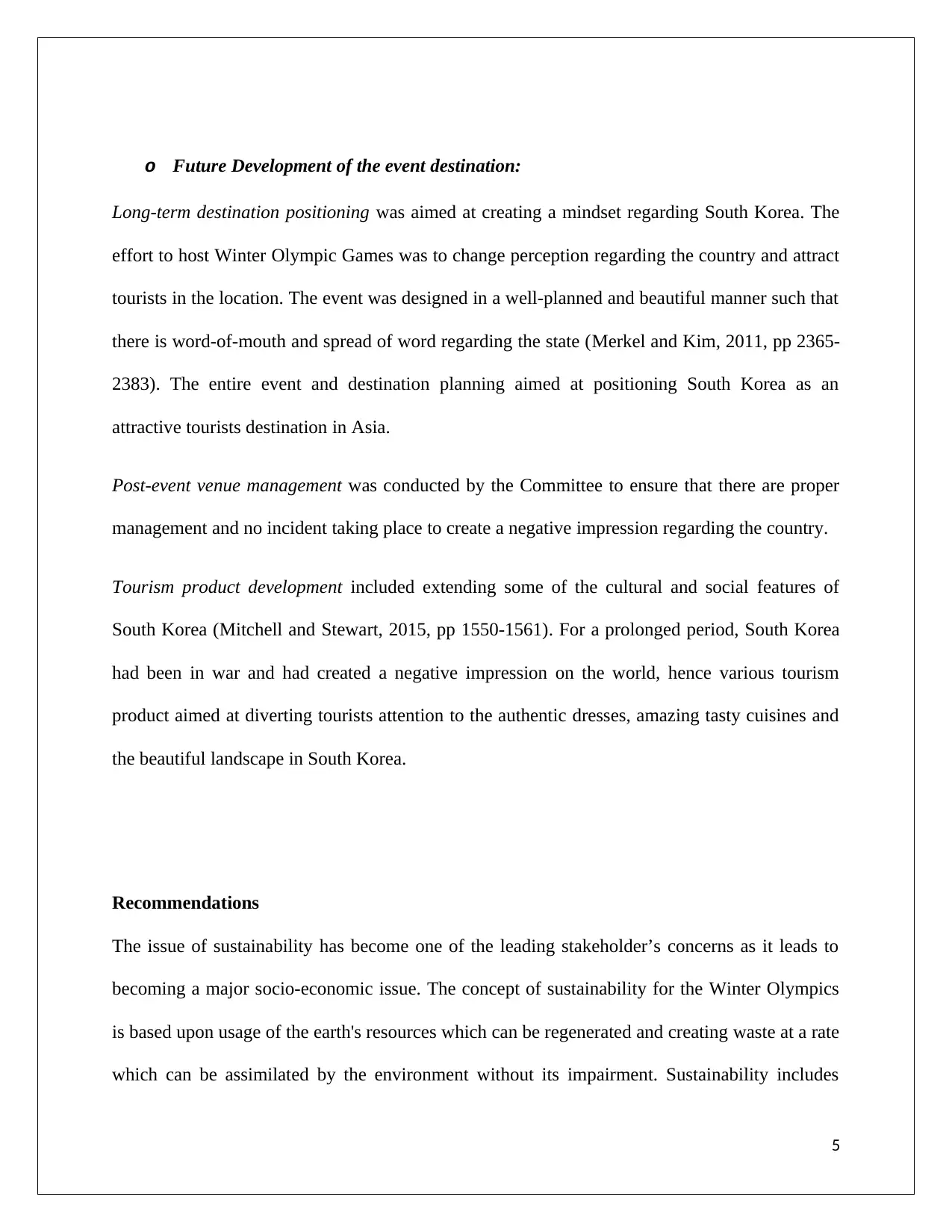
o Future Development of the event destination:
Long-term destination positioning was aimed at creating a mindset regarding South Korea. The
effort to host Winter Olympic Games was to change perception regarding the country and attract
tourists in the location. The event was designed in a well-planned and beautiful manner such that
there is word-of-mouth and spread of word regarding the state (Merkel and Kim, 2011, pp 2365-
2383). The entire event and destination planning aimed at positioning South Korea as an
attractive tourists destination in Asia.
Post-event venue management was conducted by the Committee to ensure that there are proper
management and no incident taking place to create a negative impression regarding the country.
Tourism product development included extending some of the cultural and social features of
South Korea (Mitchell and Stewart, 2015, pp 1550-1561). For a prolonged period, South Korea
had been in war and had created a negative impression on the world, hence various tourism
product aimed at diverting tourists attention to the authentic dresses, amazing tasty cuisines and
the beautiful landscape in South Korea.
Recommendations
The issue of sustainability has become one of the leading stakeholder’s concerns as it leads to
becoming a major socio-economic issue. The concept of sustainability for the Winter Olympics
is based upon usage of the earth's resources which can be regenerated and creating waste at a rate
which can be assimilated by the environment without its impairment. Sustainability includes
5
Long-term destination positioning was aimed at creating a mindset regarding South Korea. The
effort to host Winter Olympic Games was to change perception regarding the country and attract
tourists in the location. The event was designed in a well-planned and beautiful manner such that
there is word-of-mouth and spread of word regarding the state (Merkel and Kim, 2011, pp 2365-
2383). The entire event and destination planning aimed at positioning South Korea as an
attractive tourists destination in Asia.
Post-event venue management was conducted by the Committee to ensure that there are proper
management and no incident taking place to create a negative impression regarding the country.
Tourism product development included extending some of the cultural and social features of
South Korea (Mitchell and Stewart, 2015, pp 1550-1561). For a prolonged period, South Korea
had been in war and had created a negative impression on the world, hence various tourism
product aimed at diverting tourists attention to the authentic dresses, amazing tasty cuisines and
the beautiful landscape in South Korea.
Recommendations
The issue of sustainability has become one of the leading stakeholder’s concerns as it leads to
becoming a major socio-economic issue. The concept of sustainability for the Winter Olympics
is based upon usage of the earth's resources which can be regenerated and creating waste at a rate
which can be assimilated by the environment without its impairment. Sustainability includes
5
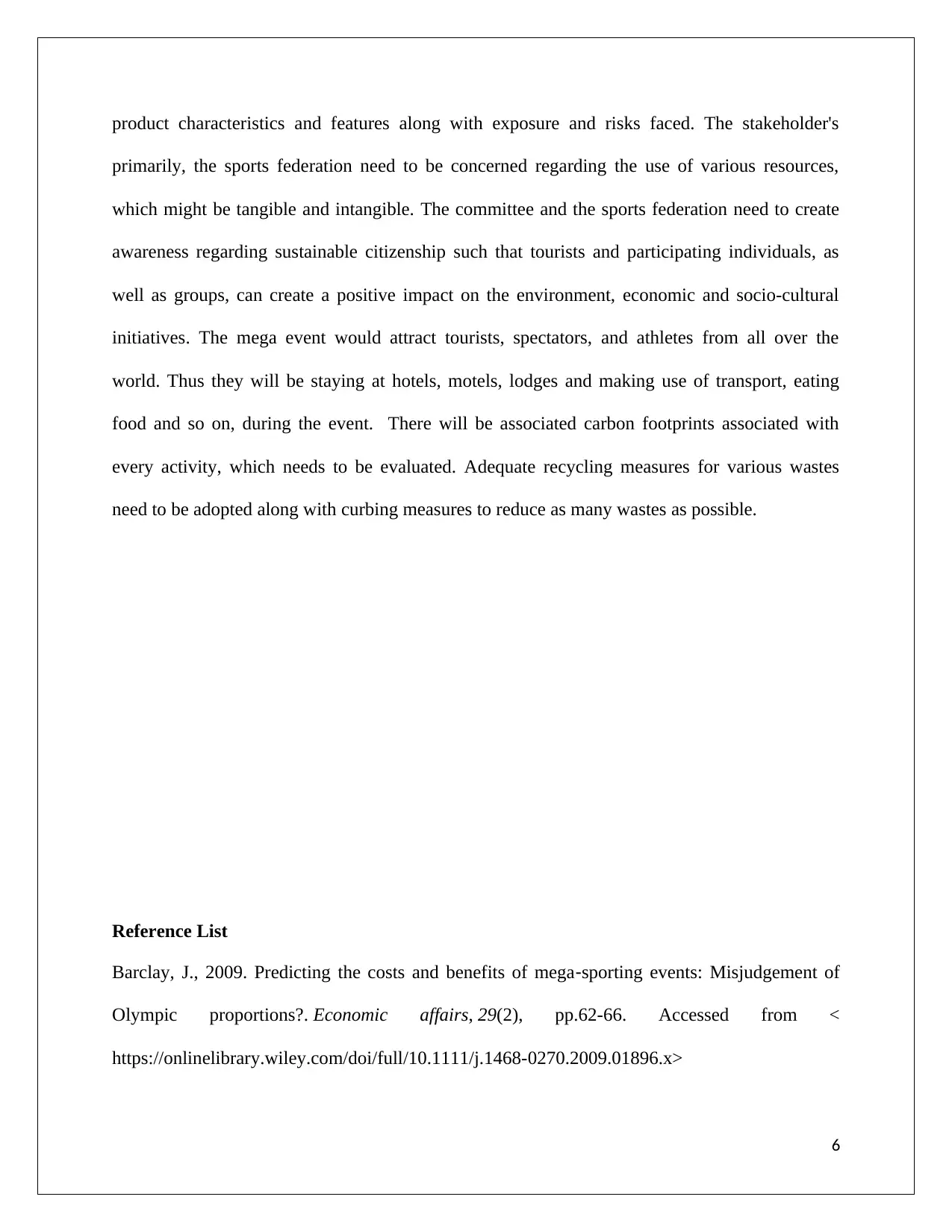
product characteristics and features along with exposure and risks faced. The stakeholder's
primarily, the sports federation need to be concerned regarding the use of various resources,
which might be tangible and intangible. The committee and the sports federation need to create
awareness regarding sustainable citizenship such that tourists and participating individuals, as
well as groups, can create a positive impact on the environment, economic and socio-cultural
initiatives. The mega event would attract tourists, spectators, and athletes from all over the
world. Thus they will be staying at hotels, motels, lodges and making use of transport, eating
food and so on, during the event. There will be associated carbon footprints associated with
every activity, which needs to be evaluated. Adequate recycling measures for various wastes
need to be adopted along with curbing measures to reduce as many wastes as possible.
Reference List
Barclay, J., 2009. Predicting the costs and benefits of mega‐sporting events: Misjudgement of
Olympic proportions?. Economic affairs, 29(2), pp.62-66. Accessed from <
https://onlinelibrary.wiley.com/doi/full/10.1111/j.1468-0270.2009.01896.x>
6
primarily, the sports federation need to be concerned regarding the use of various resources,
which might be tangible and intangible. The committee and the sports federation need to create
awareness regarding sustainable citizenship such that tourists and participating individuals, as
well as groups, can create a positive impact on the environment, economic and socio-cultural
initiatives. The mega event would attract tourists, spectators, and athletes from all over the
world. Thus they will be staying at hotels, motels, lodges and making use of transport, eating
food and so on, during the event. There will be associated carbon footprints associated with
every activity, which needs to be evaluated. Adequate recycling measures for various wastes
need to be adopted along with curbing measures to reduce as many wastes as possible.
Reference List
Barclay, J., 2009. Predicting the costs and benefits of mega‐sporting events: Misjudgement of
Olympic proportions?. Economic affairs, 29(2), pp.62-66. Accessed from <
https://onlinelibrary.wiley.com/doi/full/10.1111/j.1468-0270.2009.01896.x>
6
⊘ This is a preview!⊘
Do you want full access?
Subscribe today to unlock all pages.

Trusted by 1+ million students worldwide
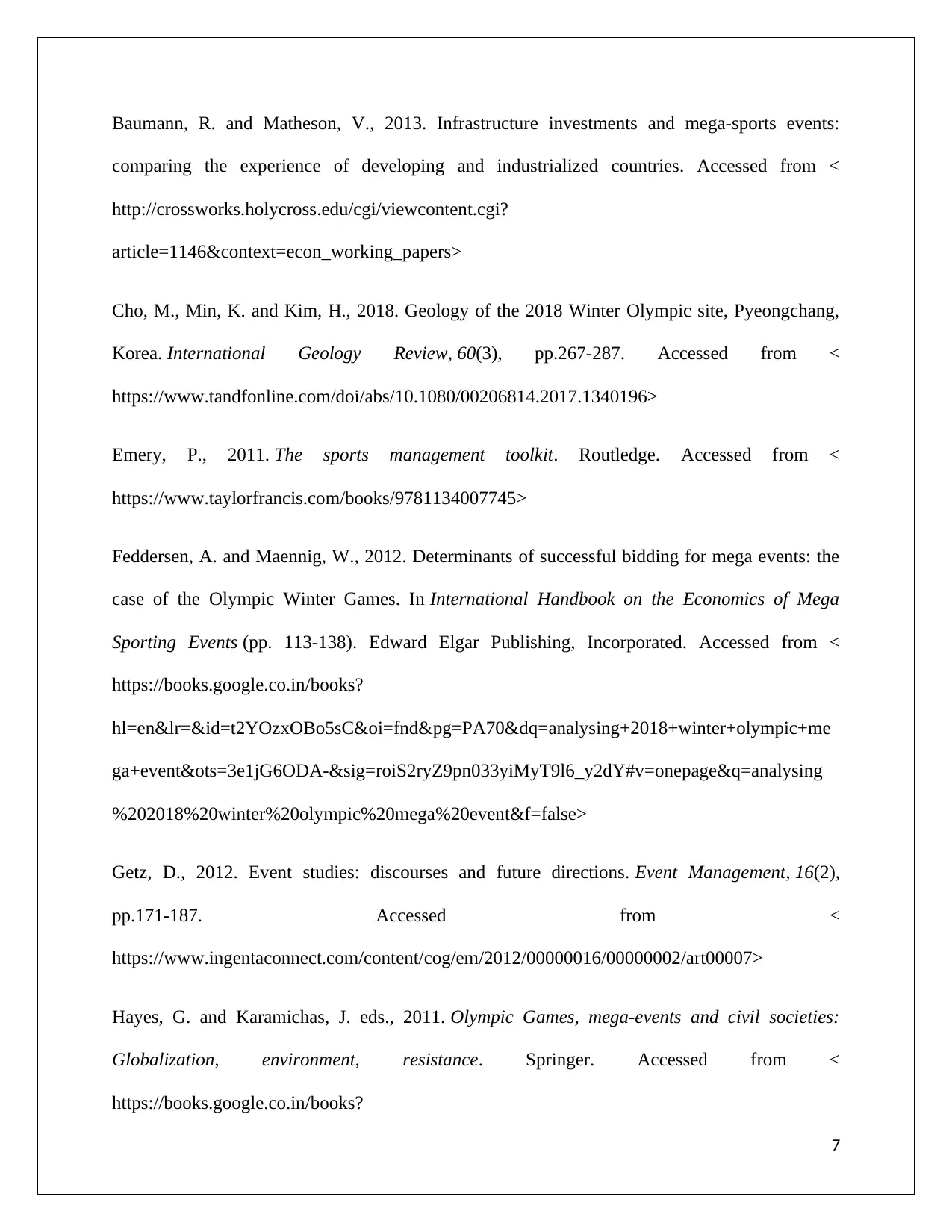
Baumann, R. and Matheson, V., 2013. Infrastructure investments and mega-sports events:
comparing the experience of developing and industrialized countries. Accessed from <
http://crossworks.holycross.edu/cgi/viewcontent.cgi?
article=1146&context=econ_working_papers>
Cho, M., Min, K. and Kim, H., 2018. Geology of the 2018 Winter Olympic site, Pyeongchang,
Korea. International Geology Review, 60(3), pp.267-287. Accessed from <
https://www.tandfonline.com/doi/abs/10.1080/00206814.2017.1340196>
Emery, P., 2011. The sports management toolkit. Routledge. Accessed from <
https://www.taylorfrancis.com/books/9781134007745>
Feddersen, A. and Maennig, W., 2012. Determinants of successful bidding for mega events: the
case of the Olympic Winter Games. In International Handbook on the Economics of Mega
Sporting Events (pp. 113-138). Edward Elgar Publishing, Incorporated. Accessed from <
https://books.google.co.in/books?
hl=en&lr=&id=t2YOzxOBo5sC&oi=fnd&pg=PA70&dq=analysing+2018+winter+olympic+me
ga+event&ots=3e1jG6ODA-&sig=roiS2ryZ9pn033yiMyT9l6_y2dY#v=onepage&q=analysing
%202018%20winter%20olympic%20mega%20event&f=false>
Getz, D., 2012. Event studies: discourses and future directions. Event Management, 16(2),
pp.171-187. Accessed from <
https://www.ingentaconnect.com/content/cog/em/2012/00000016/00000002/art00007>
Hayes, G. and Karamichas, J. eds., 2011. Olympic Games, mega-events and civil societies:
Globalization, environment, resistance. Springer. Accessed from <
https://books.google.co.in/books?
7
comparing the experience of developing and industrialized countries. Accessed from <
http://crossworks.holycross.edu/cgi/viewcontent.cgi?
article=1146&context=econ_working_papers>
Cho, M., Min, K. and Kim, H., 2018. Geology of the 2018 Winter Olympic site, Pyeongchang,
Korea. International Geology Review, 60(3), pp.267-287. Accessed from <
https://www.tandfonline.com/doi/abs/10.1080/00206814.2017.1340196>
Emery, P., 2011. The sports management toolkit. Routledge. Accessed from <
https://www.taylorfrancis.com/books/9781134007745>
Feddersen, A. and Maennig, W., 2012. Determinants of successful bidding for mega events: the
case of the Olympic Winter Games. In International Handbook on the Economics of Mega
Sporting Events (pp. 113-138). Edward Elgar Publishing, Incorporated. Accessed from <
https://books.google.co.in/books?
hl=en&lr=&id=t2YOzxOBo5sC&oi=fnd&pg=PA70&dq=analysing+2018+winter+olympic+me
ga+event&ots=3e1jG6ODA-&sig=roiS2ryZ9pn033yiMyT9l6_y2dY#v=onepage&q=analysing
%202018%20winter%20olympic%20mega%20event&f=false>
Getz, D., 2012. Event studies: discourses and future directions. Event Management, 16(2),
pp.171-187. Accessed from <
https://www.ingentaconnect.com/content/cog/em/2012/00000016/00000002/art00007>
Hayes, G. and Karamichas, J. eds., 2011. Olympic Games, mega-events and civil societies:
Globalization, environment, resistance. Springer. Accessed from <
https://books.google.co.in/books?
7
Paraphrase This Document
Need a fresh take? Get an instant paraphrase of this document with our AI Paraphraser
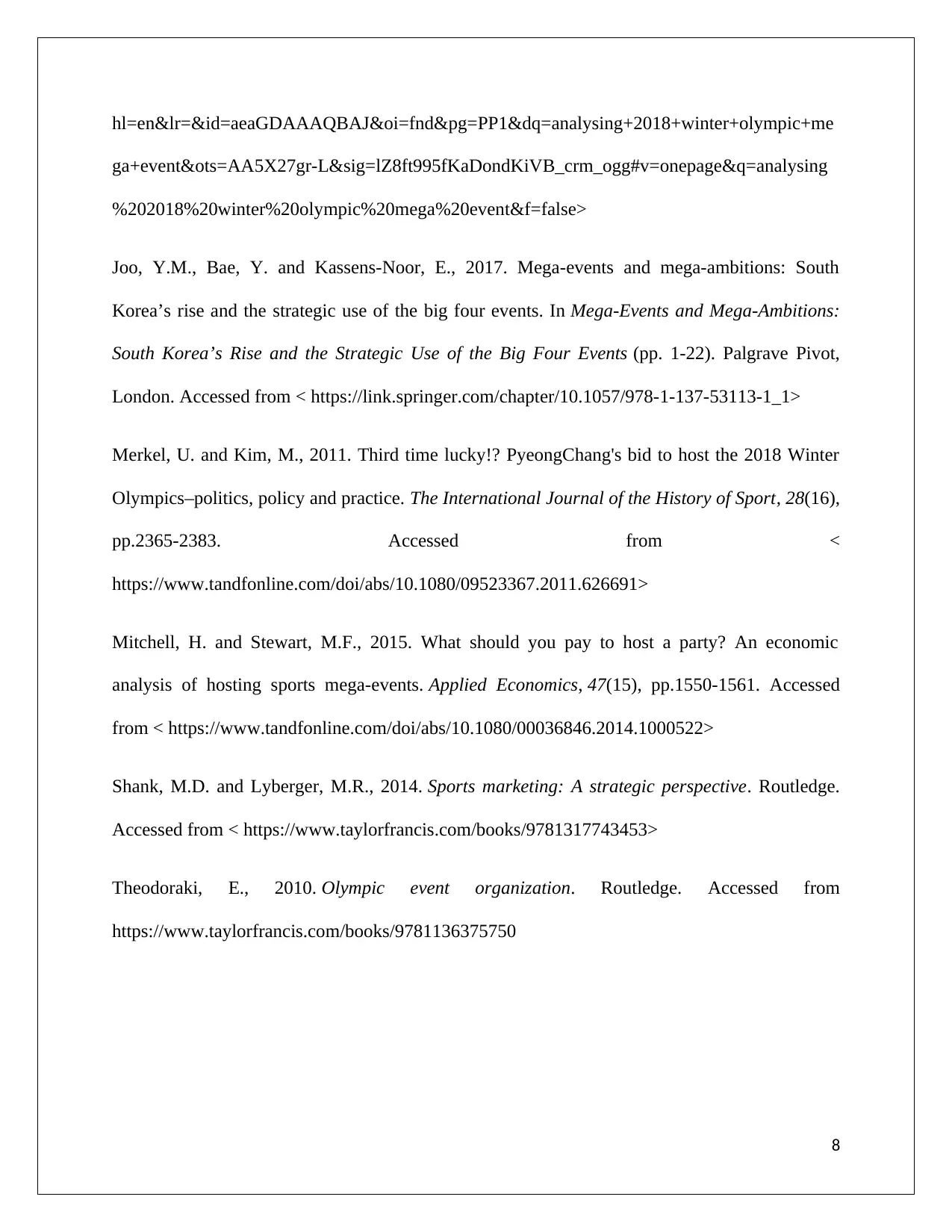
hl=en&lr=&id=aeaGDAAAQBAJ&oi=fnd&pg=PP1&dq=analysing+2018+winter+olympic+me
ga+event&ots=AA5X27gr-L&sig=lZ8ft995fKaDondKiVB_crm_ogg#v=onepage&q=analysing
%202018%20winter%20olympic%20mega%20event&f=false>
Joo, Y.M., Bae, Y. and Kassens-Noor, E., 2017. Mega-events and mega-ambitions: South
Korea’s rise and the strategic use of the big four events. In Mega-Events and Mega-Ambitions:
South Korea’s Rise and the Strategic Use of the Big Four Events (pp. 1-22). Palgrave Pivot,
London. Accessed from < https://link.springer.com/chapter/10.1057/978-1-137-53113-1_1>
Merkel, U. and Kim, M., 2011. Third time lucky!? PyeongChang's bid to host the 2018 Winter
Olympics–politics, policy and practice. The International Journal of the History of Sport, 28(16),
pp.2365-2383. Accessed from <
https://www.tandfonline.com/doi/abs/10.1080/09523367.2011.626691>
Mitchell, H. and Stewart, M.F., 2015. What should you pay to host a party? An economic
analysis of hosting sports mega-events. Applied Economics, 47(15), pp.1550-1561. Accessed
from < https://www.tandfonline.com/doi/abs/10.1080/00036846.2014.1000522>
Shank, M.D. and Lyberger, M.R., 2014. Sports marketing: A strategic perspective. Routledge.
Accessed from < https://www.taylorfrancis.com/books/9781317743453>
Theodoraki, E., 2010. Olympic event organization. Routledge. Accessed from
https://www.taylorfrancis.com/books/9781136375750
8
ga+event&ots=AA5X27gr-L&sig=lZ8ft995fKaDondKiVB_crm_ogg#v=onepage&q=analysing
%202018%20winter%20olympic%20mega%20event&f=false>
Joo, Y.M., Bae, Y. and Kassens-Noor, E., 2017. Mega-events and mega-ambitions: South
Korea’s rise and the strategic use of the big four events. In Mega-Events and Mega-Ambitions:
South Korea’s Rise and the Strategic Use of the Big Four Events (pp. 1-22). Palgrave Pivot,
London. Accessed from < https://link.springer.com/chapter/10.1057/978-1-137-53113-1_1>
Merkel, U. and Kim, M., 2011. Third time lucky!? PyeongChang's bid to host the 2018 Winter
Olympics–politics, policy and practice. The International Journal of the History of Sport, 28(16),
pp.2365-2383. Accessed from <
https://www.tandfonline.com/doi/abs/10.1080/09523367.2011.626691>
Mitchell, H. and Stewart, M.F., 2015. What should you pay to host a party? An economic
analysis of hosting sports mega-events. Applied Economics, 47(15), pp.1550-1561. Accessed
from < https://www.tandfonline.com/doi/abs/10.1080/00036846.2014.1000522>
Shank, M.D. and Lyberger, M.R., 2014. Sports marketing: A strategic perspective. Routledge.
Accessed from < https://www.taylorfrancis.com/books/9781317743453>
Theodoraki, E., 2010. Olympic event organization. Routledge. Accessed from
https://www.taylorfrancis.com/books/9781136375750
8
1 out of 8
Related Documents
Your All-in-One AI-Powered Toolkit for Academic Success.
+13062052269
info@desklib.com
Available 24*7 on WhatsApp / Email
![[object Object]](/_next/static/media/star-bottom.7253800d.svg)
Unlock your academic potential
Copyright © 2020–2026 A2Z Services. All Rights Reserved. Developed and managed by ZUCOL.





